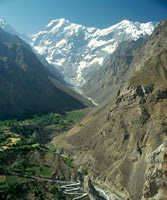FAISLABAD
 Faislabad is a city located in the province of Punjab, Pakistan. It was formerly known as Lyallpur. Faisalabad is the third largest city in Pakistan after Karachi and Lahore with an estimated 2006 population of 2.6 million (city proper). The entire district had a population of about 5.4 million in 1998.
Faislabad is a city located in the province of Punjab, Pakistan. It was formerly known as Lyallpur. Faisalabad is the third largest city in Pakistan after Karachi and Lahore with an estimated 2006 population of 2.6 million (city proper). The entire district had a population of about 5.4 million in 1998.It is an important industrial centre located in the Punjab province, west of Lahore. The city-district of Faisalabad is bound on the north by the districts of Gujranwala and Sheikhupura, on the east by Sahiwal, on the south by Toba Tek Singh and on the west by Jhang. Its located 1135Km from Karachi, 128 km from Lahore, 350 km from Islamabad/Rawalpindi, 187 km from Burewala and 70 km from Jhang.
The city (formerly known as Lyallpur) is at a road and railway junction, which has played an influential role in the development of Faisalabad's trade and economy. The city lies in an area watered by the Lower Chenab River which has expanded the production of cotton, wheat, vegetables, and fruits. This has lead to theses becoming majorly exported out of the country counting 25% of the total exports out of Pakistan. The city is also an industrial centre with major railway repair yards, engineering works, and mills that process sugar, flour, and oil seed. Produce includes super phosphates, cotton and silk textiles, hosiery, dyes, agricultural equipment, and ghee (clarified butter). Faisalabad is also the site of the prestigious University of Agriculture, founded in 1909.
Geography and climate:
Faisalabad is located in the northeast of Punjab. The city covers an area of approximately 830 square kilometres, comprised largely of flat or rolling plains. It has a population around 5 million. It is also the third largest city of Pakistan. It lies between longitude 73°74 East, latitude 30°31.5 North, with an elevation of 605 feet above sea level. There are no natural boundaries between Faisalabad and its adjoining districts. Faisalabad is bounded by Hafizabad and Sheikhupura towards north and northeast, by Sheikhupura Okara and Sahiwal towards east and southeast, and by Jhang and Toba Tek Singh towards west and southwest. Faisalabad District Authority’s notified controlled area is 1280 sq. km. River Chenab flows about 30 km in the north west while River Ravi meanders about 40 km off the city in the south east. The lower Chenab canal is the main source of irrigation water, which meets the requirements of 80% of cultivated land. The soil of Faisalabad comprises of alluvial deposits mixed with loess having calcareous characteristics which makes the soil very fertile.
The climate of the district gets a taste of both extremes. The maximum temperature in summer reaches upto 50°C (or 122°F). In winter, it may, at times. fall below freezing point down to -1 °C. The mean maximum and minimum temperature in summer are 39°C and 27°C respectively. In winter it peaks at around 21°C and 6°C respectively. The summer season starts from April and continues till October. May, June and July are the hottest months. The winter season, on the other hand, starts from November and continues till March. December, January and February are the coldest months. The average rainfall is about 2000 mm which is able to keep the soil very fertile.
Government
Faisalabad City-district formerly comprised six sub-divisions; Faisalabad City, Faisalabad Sadr, Chak Jhumra, Jaranwala, Samundri, and Tandlianwala. In 2005, Faisalabad was reorganised as a City-District composed of eight autonomous towns.Faisalabad covers an area of 5,856 square kilometers while the population is approximately 35,47,446.
Lyallpur Town
Madina Town
Jinnah Town
Iqbal Town
Chak Jhumra Town
Jaranwala Town
Samundri Town
Tandlianwala Town
Education:
Faisalabad has a literacy rate of approximately 40% which is much much less than the neighbouring countries. Due to this illiteracy level the city has been unsuccessful to control its economic development. several institutions of higher education and several research centres including:
University of Agriculture, Faisalabad
Institute of Cost & Management Accountants of Pakistan
Institute of Chartered Accountants of Pakistan
Government College University Faisalabad
National Textile University
NFC Institute of Engineering and Fertilizer Research
University of Faisalabad
National University of Modern Languages (NUML)
Government College of Technology
Preston University
Ayub Agricultural Research Institute
Punjab Medical College
Faisalabad College of Science & Commerce
National Institute of Biotechnology and Genetical Engineering NIBGE
National Institute for Agriculture and Biology (NIAB)
Independent Medical University (IMU)
Education University (EU)
Faisalabad Medical College
Faisalabad Institute of Cardiology
CCAPS, Accountancy institiute



Nice information!!!
ReplyDeletedude!!!
keep up ure sexy jobb!!!(: